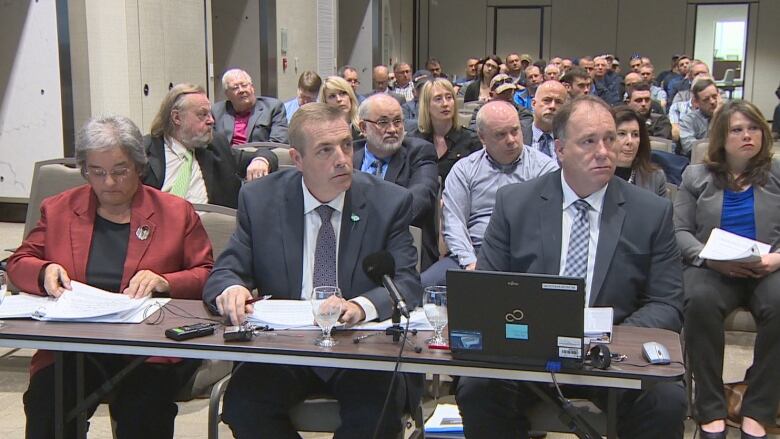LIFO could cut inshore shrimp catch to one third, minister says
All-party committee, fishermen say LIFO policy will cost inshore fleets most

Newfoundland and Labrador's all-party committee on northern shrimp allocations appealed to members of a federal review board today to scrap government's "last in, first out" policy.
- 'About survival of our communities:' shrimp protesters tell Ottawa to choose local over 'foreign interests'
- Ottawa should scrap 'last in, first out' policy, say fishermen
- Offshore shrimp fishery more valuable than inshore, economist says
The external panel is examining who will bear the brunt of quota cuts brought on bydeclining shrimp stocks.
"As an all-party committee, we've gone through report after report [from the department of finance]," said FisheriesMinister Steve Crocker.
"All the impact numbers show that the inshore [fishery] has a greater impact on local economies than the offshore."
This is the ministerial advisory panel that will come up with recommendations on allocation of shrimp quota #nlpoli pic.twitter.com/FWEksN7pBJ
—@PeterCBCCrocker, who presented alongside Kevin Parsons, the ToryMHA for Cape St. Francis, and NDP MHALorraine Michael, wants the cuts to be shared between offshore and inshore fleets.
The policy, commonly referred to as LIFO,aims to protect fishinglicensesfor those who've held them the longest.
But the province arguesthat small inshore boats will be hit hardestwhen quotas are cut because they were the last to enter the fishery and that doesn't bode well for the economy.
"We said it in our conclusion this morning. If LIFO is applied this year, the inshore harvesters are going to have approximately 10,000 tonnes to harvest. Last year they harvested I think it was 32 or 34,000 tonnes," said Crocker.
Lots of fishermen here listening to the presentations #nlpoli pic.twitter.com/PDuG0683nJ
—@PeterCBC"So you can do the simple math, that's like one-third of what they had to harvest last year. Over 240 enterprises, 750 crew members, 2,200 plant workers apply the numbers."
Fishermen from across the province have also protested the policy in recent months, saying it makes fishing difficult for local harvesters.
Crocker argued the policy could result in the number of shrimp processing plants drop from 10 to two.
With files from Peter Cowan












_(720p).jpg)


 OFFICIAL HD MUSIC VIDEO.jpg)
.jpg)



























































































